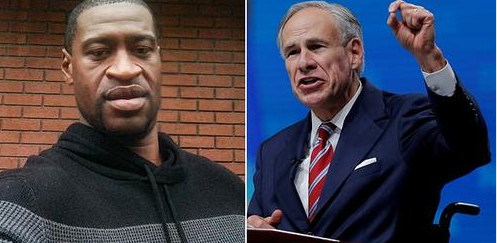A Texas board on Thursday withdrew its recommendation to pardon George Floyd over a 2004 drug conviction, days before Governor Greg Abbott was expected to announce his list of annual holiday pardons.
In February 2004, Floyd was arrested in Houston by officer Gerald Goines for selling $10 worth of crack in a police sting, and later pleaded guilty to a drug charge and served 10 months in prison.
The Texas Board of Pardon and Paroles had unanimously supported a posthumous pardon for Floyd but is now saying ‘procedural errors’ were found in its recommendation.
The unusual reversal was announced by Abbott’s office two days before Christmas, around the time he typically doles out his annual pardons.
He is known to pardon a handful of citizens – typically for minor offenses committed years ago – every Christmas as part of a holiday tradition. However, he has yet to announce his decision.
Floyd’s name was withdrawn along with two dozen other clemency recommendations that had been submitted by the board.
In a letter dated December 16 but not released publicly until now, the board told Abbott that it had identified ‘unexplained departures’ from its process of issuing pardons and needed to reconsider more than a third of the 67 clemency recommendations it sent to Abbott this year, including the one for Floyd.
The withdrawn endorsement was met with outrage from a public defender who submitted the pardon application for Floyd, who spent much of his life in Houston before his death in 2020 under the knee of a white Minneapolis police officer.
Allison Mathis, an attorney in Houston, worked to get the posthumous recommendation, insisting that Floyd never conducted the crime to begin with.
‘It doesn’t matter who you think George Floyd was, or what you think he stood for or didn’t stand for. What matters is he didn’t do this. It’s important for the governor to correct the record to show he didn’t do this.’
Since Floyd’s pardon recommendation has been withdrawn, she has accused the two-term Republican governor of using the pardon to gain favor with voters ahead of Texas’ March GOP primary elections as he faces challengers from the far right.
In October, the board had unanimously recommended that Floyd become just the second person in Texas since 2010 to receive a posthumous pardon from the governor.
‘As a result of the Board’s withdrawal of the recommendation concerning George Floyd, Governor Abbott did not have the opportunity to consider it,’ Abbott spokeswoman Renae Eze said in a statement.
Mathis called the last-minute reversal a ‘ridiculous farce.’ She said the board – which is stocked with Abbott appointees – did not make her aware of any issues prior to the announcement from the governor’s office.
‘It really strains credibility for them to say now that it’s out of compliance, after the board has already voted on it,’ she said.
Floyd grew up and was laid to rest in Houston. In June, former Minneapolis police Officer Derek Chauvin was sentenced to 22 and a half years in prison for Floyd’s murder, which had led to a national reckoning in the U.S. over race and policing.
Pardons restore the rights of the convicted and forgive them in the eyes of the law. But in Floyd’s case, his family and supporters said a posthumous pardon in Texas would show a commitment to accountability.
But the global spotlight on the death of Floyd in police custody 16 years later is not why prosecutors revisited his Houston case. Instead, it was prompted by a deadly Houston drug raid in 2019 that involved the same officer who arrested Floyd.
Prosecutors say that former Officer Goines, lied to obtain the search warrant for the raid that killed a husband and wife. Goines, who is no longer on the Houston force and faces murder charges, has denied wrongdoing.
Since Goines was discredited, the office of Harris County District Attorney Kim Ogg has since dismissed more than 160 drug convictions tied to Goines
for political gain.
David Gutierrez, chairman of Texas’ parole board, said in the letter to Abbott that he ordered a review after the board had recommended more clemency recommendations this year than at any point in two decades.
He did not specify how Floyd’s recommendation skirted the usual procedures, instead only broadly pointing to several sets of rules that Gutierrez said the board did not follow.
For months, Abbott gave no indication whether he would grant the pardon in the months since the parole board put the recommendation on his desk.
The prolonged silence raised questions by Mathis and others over whether political calculations were at play in Abbott’s decision. His office has not responded to those charges



